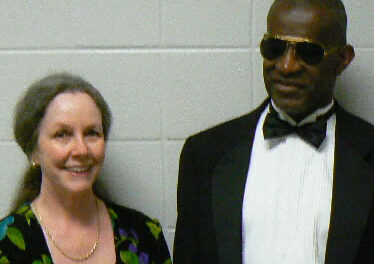Six guitarists — that’s 36 strings played by 12 hands and 60 fingers — provided some splendid sounds during the evenings of the 16th annual East Carolina School of Music Guitar Festival and Workshop. The workshop brings students, teachers and professionals together to help participants broaden their skills on the classical guitar, and after the day’s classes end, the A.J. Fletcher Recital Hall stage becomes a performance venue for the teachers and professionals to give solo performances for the students and community.
This year, the six guitarists took the Fletcher stage over three evenings, and things just got better and better each night — yet another example of the outstanding musical offerings available to this region from the ECU music program.
Starting with a performance by festival artistic director Elliot Frank and concluding with a set by frequent festival performer Andrew Zohn, the three programs explored a wide variety of playing and compositional styles, from the relatively straightforward to the complex, from traditional to near-avant garde, from the early 18th century to a piece written as recently as this spring. The programs offered listeners a chance to hear the rich and varied repertoire for this most intimate of instruments.
The two soloists on the third night (July 12) — Jan Bartlema, a Dutchman new to the festival and workshop, and Andrew Zohn, a frequent guest — provided the most technically demanding and musically proficient performances. With effortless and near-flawless playing, they presented sets that were both interesting and challenging, including some of their own compositions. Bartlema’s program consisted of works from the 20th and 21st centuries, and before eyeballs roll it must be said that all were accessible (in varying degrees), and some were even dazzling. Zohn’s program spanned the 19th to 21st centuries, and he, too, showed that contemporary is not necessarily bad in the realm of classical music.
Bartlema’s program offered perhaps the most interesting mix of worldwide contemporary music from composers generally not well known to American audiences, although he opened his set with a lovely reading of Agustin Barrios Mangoré’s “Gavota al estilo antiguo,” a short piece with a near-Baroque feel. The set also featured Pieter van der Staak’s “Three Moods from the Song of Solomon,” which alternated slow and fast tempi and had a lovely mix of plucked string chords and bell-like harmonics, and Atanas Ourkouzounov’s “Caprice on an Orthodox Chant,” with its nervous energy and a bass line that mimics a bass voice in a chant. Ernesto Cordero’s “Dos piezas Afro-Antillanas” mixed harmonics with finger drumming and included some vibrato chords. Bartlema’s own “Deux Prieres” included a lovely section built on repetitive arpeggios.
Zohn’s set ranged from the elegant Sonata No. 1 in E-minor by Heinrich Albert to his own “Con Pulso,” written this spring in tribute to Carlos Pérez, a guitarist he met and who was a guest performer at the ECU festival. Along with the Albert sonata, the other highlight of his set was “Fantaisie sur deux motifs de la Norma,” Op. 16, by Napoleon Coste, a 19th century French guitarist and composer, a piece both stately and elegant.
Frank opened the first evening’s program (July 10) with an interesting series of five musical sketches of a donkey, “Platero y yo” (“Platero and I”) by 20th century composer Eduardo Sainz de la Maza. The piece employs a wide variety of playing techniques including arpeggios and harmonics and uses an occasional dissonance along with more traditional musical chord structure. Frank also gave a good reading of Bach’s Suite in E, written originally for violin (S. 1006) and later becoming Bach’s fourth suite for lute.
Also on the first evening, frequent festival instructor and performer Mary Akerman offered nice readings of works by Scarlatti, Giuliani and Isaac Albeniz, among others, with special praise for her performance of two pieces by Albeniz, “Mallorca” and “Torre Bermeja.” An interesting selection was “Homage to Marcel Dadi,” an almost jazzy piece by contemporary guitarist and composer Roland Dyens.
On the second night (July 11), You Wang, who won last year’s collegiate competition in the festival, presented a set spanning George Frederic Handel and Leo Brouwer, from Baroque orderliness to contemporary near-chaos. He provided a good range of dynamics in Handel’s Overture to Suite No. 7 and handled the challenges of Brouwer’s “Canticum” well. “Canticum” starts with splashy dissonant strumming, as if to get everyone’s attention, and includes some finger drumming but it was perhaps the least accessible piece of the three evenings. The highlight of the set, however, was You’s reading of Miguel Llobet’s “Variations on a Theme of Sor,” Op. 19, especially his rapid fingering in the seventh variation, the all-harmonics of the eighth variation, and the left hand-only playing on the neck of the ninth variation.
Chilean guitarist Carlos Pérez closed the second evening with a set of Latin pieces, including the recently discovered (2006) Cifras Selectas by 18th century composer Santiago de Murcia. Consisting of five parts, the music started in a somber mood (“La Azucena”), moved into a livelier tempo (“Zarambeques”) and finished with a spirited rondo-like section (“Canarios”). Pérez also played Maximo Diego Pujol’s Tres ensayos sobre un Boceto de Kandinski, musical impressions of art that more closely resembled Mondrian’s “Broadway Boogie Woogie” in its nervous energy than, say, Pictures at an Exhibition, and he showed the more accessible side of Leo Brouwer with three Preludios Epigramaticos, which included clusters of harmonics and a flurry of arpeggios.
With three full evenings of guitar performances of more than 30 pieces, did anyone play one of the most famous of all pieces for the instrument, Tarrega’s “Recuerdos de la Alhambra,” with its tricky and non-stop tremolo? Yes, Ms. Akerman did, and she acquitted herself quite well.











